23
January 2002
![]()
2. "17 Turkish prisoners end hunger strike after easing of jail conditions", seventeen Turkish prisoners on a hunger strike have ended their protest following the introduction of eased jail conditions last week, Justice Minister Hikmet Sami Turk said on Tuesday.
3. "Justice Minister: Petitioners seek international discussion", Yilmaz urges moderate behavior against Kurdish language petitioners.
4. "The campaign should be reclaimed by millions", calling on the Kurdish people to participate in the campaign for mother tongue, Ocalan said, "Repression can be made ineffectual by millions reclaiming the campaign" and asked for it to be spread even to villages.
5. "Geostrategic gambit nets Turkey little", Turkish Prime Minister Bulent Ecevit began a new workweek back home on Monday, after a five-day visit here for which he had little to show in the way of firm financial support for his country's flagging economy from the United States or the International Monetary Fund (IMF).
6. "Turkey's coalition partners split over language", Turkey's coalition partners were divided Tuesday over demands by students for Kurdish language education that came ahead of a key debate in parliament over a law to widen human rights.
1. - AFP - "Turkish top court defers Kurdish party's defence hearing until March":
ANKARA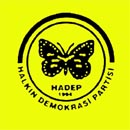
Turkey's constitutional court on Tuesday gave leaders of the country's
main pro-Kurdish party an additional month to prepare their defence
in a trial in which prosecutors hope to outlaw the movement for alleged
links to separatist guerrillas.
The ruling was in response to a request from Murat Bozlak, chairman of the People's Democracy Party (HADEP), for a 30-day trial delay, until March 1, the Anatolia news agency quoted the deputy head of the court, Hasim Kilic, as saying.
HADEP was originally scheduled to present its defence on January 30. In the trial, which began in January 1999, HADEP is charged with having links with the outlawed Kurdistan Workers' Party (PKK), which fought a 15-year armed campaign for Kurdish self-rule in Turkey's southeast. HADEP, which seeks a peaceful resolution to the Kurdish conflict, denies the charges.
Last week, chief prosecutor Sabih Kanadoglu asked the
court to ban HADEP, arguing that it had become a "focal point of
activities against the indivisible unity of Turkey", a principle
enshrined in the nation's constitution. Banning HADEP would almost certainly
strain ties between Turkey, a candidate for EU membership, and the European
Union, which has asked the country to improve its democratic processes
and human rights record before it can begin accession talks.![]()
2. - AFP - "17 Turkish prisoners end hunger strike after easing of jail conditions":
ANKARA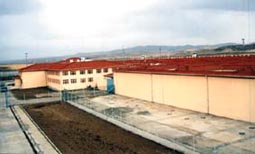
Seventeen Turkish prisoners on a hunger strike have ended their
protest following the introduction of eased jail conditions last week,
Justice Minister Hikmet Sami Turk said on Tuesday.
"We expect a more rapid abandoning of the protest. What has been done (to soften jail conditions) should be appreciated," Turk told a group of reporters, according to Anatolia news agency. The minister said 129 inmates continued to fast as part of the protest against new high security jails, which began in October 2000 after cells for up to three people replaced dormitories housing dozens.
The strikers, backed by human rights groups, say the new prison design leaves inmates isolated and more vulnerable to abuse. In a bid to end the hunger strike, which has so far claimed 45 lives, Turk issued a circular Friday authorising inmates to meet and socialize under certain conditions. Under the circular, inmates who participate in recreational activities arranged by jail officials will also be allowed to meet and chat in groups of 10 people for a maximum five hours a week.
But human rights activists argue that the move will have little impact because prisoners have already refused to take part in the recreational activities. Out of some 2,000 inmates in the new jails only about a dozen have agreed to join such activities, according to the Human Rights Association (IHD).
The government has categorically ruled out a return to
the dormitory system, arguing that the packed compounds had become strongholds
for criminal groups, which frequently rioted and took prison officials
hostage. The total toll of the hunger strike includes both prisoners
and outside supporters of the movement. ![]()
3. Turkish Daily News - "Justice Minister: Petitioners seek international discussion":
Yilmaz urges moderate behavior against Kurdish language
petitioners
Motherland Party (ANAP) leader and Deputy Prime Minister Mesut Yilmaz
said yesterday that it was not possible to process petitions demanding
education in Kurdish education according to the Constitution but urged
moderate behavior against the petitioners.
Yilmaz responded to questions from reporters at Esenboga Airport on Tuesday prior to his departure for Bulgaria in order to attend a Turco-Bulgarian Joint Economic Commission meeting. Upon a question on petitions demanding education in Kurdish language, Yilmaz said that it would be beneficial to behave to those demanding education in Kurdish moderately.
Meanwhile, Justice Minister Hikmet Sami Turk said those who petitioned for Kurdish language education aimed at bringing up the issue at the European Court with a sentence to be given by Turkey and thus making the issue gain an international dimension, Anatolia news agency reported. Turk stressed that Turkey's language for education was Turkish according to Constitution's Article 42.
Responding to questions from reporters following a dinner on Monday evening, Turk also said that there was no forbidden language concept in Turkey, adding that all kinds of languages are spoken. "Constitution's Article 42 recognizes the education language as Turkish, Thus, the petitions demanding Kurdish language education are contradictory with this Article," said Turk.
According to Turk, certain citizens are involved in this act with the motivation of an organization. He said that there were also citizens who petitioned for Kurdish language education without knowing the content of their petitions. He urged that a good distinction should be made between those petitioned voluntarily or those by coincidence.
Reiterating Turk's words, National education Minister Metin Bostancioglu noted that no language other than Turkish can be taught as the native language to turkish citizens according to the Constitution, stressing that they were unable to positively respond to those petitions demanding education in Kurdish.
Recalling that the Interior Ministry had issued a circular on the petitions demanding education in Kurdish, Bostancioglu said that if those petitions carried a political aim, necessary measures would be taken.
The Interior Ministry had asked governors from 81 provinces, National Education Ministry and Gendarmerie Command to prevent the violation of the Constitution with the petitions demanding education in the Kurdish language.
On the other hand, 52 out of 69 university students who
were detained because of their petitions demanding the Kurdish language
were released by the State Security Court's prosecutor. Those 17 students
were transferred to the court on duty. ![]()
4. - Kurdish Observer - "The campaign should be reclaimed by millions":
Calling on the Kurdish people to participate in the campaign for mother tongue, Ocalan said, "Repression can be made ineffectual by millions reclaiming the campaign" and asked for it to be spread even to villages.
MHA / FRANKFURT 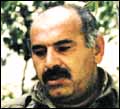
PKK Council of Leaders asked for the demand for Kurdish education
to be spread. Participated in the "Gundem" program on Medya
TV the other day, PKK Council of Leaders member Osman Ocalan considered
the repression on the campaign "insistence on the wrong".
Ocalan emphasized that the demand was legitimate, drawing attention that the circular of the Interior Ministry violated the Constitution. Ocalan continued to say the following: "The circular violates the Constitution. The Constitution guarantees the right to submit petition for everybody. Therefore our people should file charges."
The Kurdish leader also said the following: "If they do not want political crisis while they have economic crisis on their hand, the way to democratic solution should not be closed. We insist on our positive stance. We will reinforce the steps we have taken at our 8. Congress." He called on the Kurdish people to participate in the campaign with a spirit of mobilization, asking for it to be spread even to villages.
Ocalan underscored the fact that the Kurdish people should speak Kurdish everywhere, adding the following: "We carry out a struggle for honor. Nobody who does not struggle for his/her own mother tongue can say he/she is honorful."
"Kurds did all they could"
Ocalan stressed that the Kurdish party did all it could to solve the problems within the framework of democratic unity. He said the following: "I need time, Turkey says. Everybody has offered support but Turkey has misunderstood it and missed the opportunities. Today the conditions of neither the world nor Turkey offer opportunity for the existing regime to continue as it is."
Stating that nobody could criticize PKK for not being serious, Ocalan had to say the following: "They say that PKK is behind the campaign. Now, what is important is not whether PKK is behind it or not but whether the demand is legitimate or not. We make extraordinary effort to stop the violence. Palestine is not able to succeed in it but PKK has stopped it. Therefore PKK is the guarantee for Turkey to solve its problems within the framework of democratic unity. It should abandon its chauvinist, prejudiced approaches."
"The document of 12 articles is an expression of a very backward level"
Reminding that a document of 12 articles whose source was not known was published, Osman Ocalan said that it was important from the point of view that it could cause a debate even if it was at a backward level. But he reacted against the demand to abandon the word Kurdistan: "For one thing, the word Kurdistan is the name of a geographical place. It has been called Kurdistan for two thousand years. Every nation has a definition. Kurds are a nation. Guerrilla is an armed force, and like it or not, an armed force is a potential threat, it should be destroyed. Now, this is a very backward approach, nevertheless as it caused a ground for debate, it could be useful regardless of its content."
Ocalan asked for Turkey the following demands for a
democratic and peaceful future:
"- Life conditions of PKK President Apo should be improved.
- Kurdish should be recognized as an academic language.
- Kurdish people should be supplied opportunities to develop their culture.
- Our country called Kurdistan is a wreck, it should be destroyed. It should be developed economically, social programs should be accomplished, for it special programs should be gone into effect.
- If armed forces are to be eliminated a general amnesty
should be declared. You cannot say to a guerrilla force who have been
educated for years, who are determined and conscious to surrender."
![]()
5. - Asia Times - "Geostrategic gambit nets Turkey little":
WASHINGTON / By Emad Mekay 
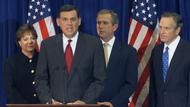 Turkish
Prime Minister Bulent Ecevit began a new workweek back home on Monday,
after a five-day visit here for which he had little to show in the way
of firm financial support for his country's flagging economy from the
United States or the International Monetary Fund (IMF). This was despite
considerable effort to capitalize on Turkey's historically close relations
with the United States and its vanguard cooperation in President George
W Bush's war against terrorism.
Turkish
Prime Minister Bulent Ecevit began a new workweek back home on Monday,
after a five-day visit here for which he had little to show in the way
of firm financial support for his country's flagging economy from the
United States or the International Monetary Fund (IMF). This was despite
considerable effort to capitalize on Turkey's historically close relations
with the United States and its vanguard cooperation in President George
W Bush's war against terrorism.
Mehmet Ali Bayar, of the Turkish embassy here, told IPS that the IMF seemed set to hold off on a hard-sought US$10 billion loan until early next month, rather than in the coming week as was originally hoped. Nevertheless, the diplomat said he was confident the fund would sign off on the loan with backing from the United States. Bayar, echoing statements by Economy Minister Kemal Dervis and by IMF officials in recent days, said the agreement had stumbled over the pace at which Turkey is implementing IMF-backed economic reforms aimed at providing greater incentive for foreign investors to enter Turkey. Specific measures include state spending curbs and bank restructuring.
IMF spokesman William Murray said the fund's executive board was expected to meet to review the Turkey loan in two or three weeks. Turkish officials said that in addition to the $10 billion from the IMF, a further $6 billion from the World Bank remains at stake.
Ecevit told reporters here on Thursday that, likewise, he had not secured a trade agreement with the United States as originally hoped but added that the two sides agreed to set up a commission next month to advance the agenda. Nor did the Turkish leader succeed in persuading US officials to raise new bilateral assistance, lower tariffs, write off some $5 billion in military debt, scrub quotas on Turkish textiles and steel, or help promote tourism.
Faruk Tabak, professor of modern Turkish studies at Georgetown University, said Ecevit went home empty-handed because "he had unrealistically high expectations".
"The prime minister thought he could capitalize on US plans to strike Iraq, but since that has not actually materialized, he couldn't make it," said Tabak.
Since military action against Saddam Hussein's Iraq remains high on the wish list of a number of key US officials, however, observers would not rule out the possibility that Turkey could yet secure economic deals on the coat-tails of US geostrategy.
"I don't think that Ecevit is going home empty-handed," said Bulent Aliriza, director of the Turkish program at the Center for Strategic and International Studies, a Washington think-tank. "Both sides will come with a formula that would allow the US to meet some of the Turkish demands. The US still needs Turkey." He attributed Washington's meager response to Ecevit in part to the slowed US economy.
Turkey supported the 1991 US-led war against Iraq and has complained of losing more than $50 billion in trade with its neighbors as a result of the Gulf War and subsequent economic blockade of Baghdad. Ecevit's government has been implementing IMF-endorsed reforms since June 1999 but remains in the throes of an acute economic crisis. It has tapped some $15.3 billion in credit from the IMF over the past two years.
US backing is seen as a major factor in continued IMF backing for Turkey, which was the first country with a majority Muslim population to offer troops for a multinational peacekeeping force in Afghanistan. Such gestures aside, said Aliriza, "Turkey needs to get its own house in order. They have not come up with a good performance on primarily attracting foreign investment. They can do a lot better."
In line with IMF conditions, the government has pushed several laws through parliament, including a bill approved this month that would put $5 billion into the ailing private banking sector. But the bill awaits approval by President Ahmet Necdet Sezer.
The European Union (EU) also has made the establishment
of a Western-style free-market economy a condition for Turkey's admission
to the EU. Like the IMF and World Bank, the EU has been anxious that
Turkey end state control over the banking, transport, and communications
industries. It also has demanded improved political and human rights.
![]()
6. - The Times of India - "Turkey's coalition partners split over language":
ISTANBUL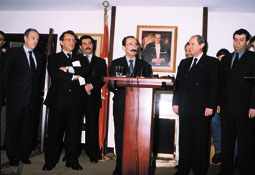
Turkey's coalition partners were divided Tuesday over demands by
students for Kurdish language education that came ahead of a key debate
in parliament over a law to widen human rights.
Hundreds of students have been detained in the past two weeks for submitting petitions requiring university education in the Kurdish language.
The detentions came as lawmakers prepare to debate human rights reforms aimed at meeting European Union membership requirements. The reforms reduce police detention periods from seven days to four and allow detainees to inform relatives or lawyers.
Turkey's deputy prime minister Mesut Yilmaz said current laws made it impossible to meet the demands of the students but called for tolerance toward them.
"... It's better to respond more moderately" to these demands, Yilmaz said.
However, his coalition partner Devlet Bahceli, who is also a deputy premier and a nationalist leader, took a harder line, echoing fears that the petitions were a concerted effort to assert Kurdish identity as the EU pressed Turkey to grant cultural rights to its estimated 12 million Kurds.
"There is no doubt that this campaign is part of
a planned game," Bahceli said. "They're aiming to squeeze
our country into a corner."
Nationalists believe the campaign is being orchestrated by the Kurdistan
Workers' Party or PKK, which fought a 15-year war for autonomy in the
largely Kurdish southeast. About 37,000 people died in the fighting,
which has largely eased since a unilateral PKK cease-fire in 1999.
Turkey amended its constitution last year to permit Kurdish-language
broadcasting, but argues that education in Kurdish could divide the
country.
Under pressure from the nationalists, the Kurdish issue is missing from the draft package of reforms due for debate in parliament next week, which will enshrine some of the constitutional changes in law.
Many blame Bahceli's nationalists for blocking more far-reaching change - "nipping the reforms in the bud," wrote the daily Radikal.
Yilmaz also hinted at divisions in the government, calling
the reforms "a compromise text."
The result is a package that barely scratches the surface of Turkey's
human rights problems, critics say, arguing that it fails to improve
laws that have seen hundreds of intellectuals and activists jailed over
the years for criticizing the state.
"As they stand now, I don't believe these measures are going to meet the EU's standards," said Kayihan Icel, a law professor at Istanbul University.
The package does not include last year's constitutional amendment abolishing the death penalty except for terrorism and treason.
Parliamentary committees have the chance to extend the package this week, ahead of a likely vote next week.
Yilmaz said he hoped the reforms could be improved in
their passage through parliament. ![]()